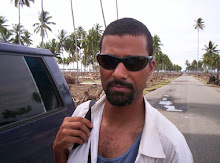
With all the best intentions, NGOs and governments planted thousands of mangrove in and around Banda Aceh. Mangroves are extraordinary ecosystems in that they provide a range of services, from nurseries for fisheries, silt filtration that keeps coral reefs healthy, wood for people, and buffers against storm waves and possibly tsunami. As such, they should be conserved wherever possible.
One issue surrounding mangroves is that they often come into direct conflict with other land uses. Aquaculture (fish and shrimp ponds) use intertidal zones where mangrove often live to produce fish for local and export products. This can often provide jobs for the local population. Studies have shown, however, that the majority of earnings from these businesses goes to larger companies outside the area (those with the resources to actually build the facilities), and that the food product are usually exported, adding little to the local food security.
So, the question in a place like Banda Aceh is this- After the entire intertidal system was wiped clean by the 2004 tsunami, should it be restored to wetlands and mangroves so that the region can benefit from the services they provide, or should the fish ponds be restored so that jobs and export income can come to the region?
I don't think there is a clear answer to this question. Many NGOs supported the mangrove replantings schemes like the failed one shown above, but did not consider how the changes in the environment would affect the success of the replanting scheme. Nor do they necessarily consider the population that needs to rebuild their livelihoods, be them environmentally sustainable or not.
One very helpful tool to address this question would be to place a value on the mangrove ecosystem and compare it to the income generated by aquaculture. This "ecosystem valuation" would provide numbers that NGOs and governments could sink their teeth into when considering coastal redevelopment policy. It would also provide critical information when reconsidering what types of coastal zone jobs should be invested in following a disaster of this scale and even smaller.
For more information on ecosystem valuation, check out The Natural Capital Project at Stanford University, http://www.naturalcapitalproject.org.

No comments:
Post a Comment